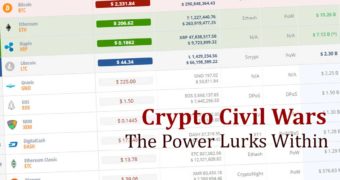No dog days of summer here. This week, Microsoft worked on enterprise technology, modern workplaces…
The Blockchain Revolution
Less than a decade after blockchain first emerged as the foundation upon which digital currency bitcoin could thrive, the technology has evolved into something with so much more potential. Nearly every facet of society could benefit from the secure, decentralized database provided by blockchain, and indeed, many already have.
Blockchain has already helped companies across the globe keep track of their international shipments, combat insurance fraud, and develop better autonomous driving systems. The tech has been used to support the implementation of renewable energy, provide refugees with food and supplies, and manage universal basic income (UBI) trials. Some experts predict that blockchain could improve how we collect taxes and vote in elections within the next five to 10 years, and it could even help usher in the era of quantum computing.
Everyone from renowned futurist and Google’s head of engineering Ray Kurzweil to internet pioneer Brian Behlendorf is bullish on the technology, but despite its remarkable growth and expansion, blockchain still has major obstacles to overcome in the industry in which it was born: finance. Though these issues are currently preventing the tech from realizing its full potential, we may soon have a way to solve them.
Who is Vitalik Buterin?
Vitalik Buterin was born in Kolomna, Moscow Oblast, Russia and lived in the area until the age of six when his parents immigrated to Canada in search of better employment opportunities.
While in grade three of elementary school in Canada, Buterin was placed into a class for gifted children and started to understand that he was drawn to math, programming, and economics. He also had the ability to add three digit numbers in his head at twice the speed of his peers.
Buterin learned about Bitcoin from his father at 17 years of age. In 2012, he obtained a Bronze Medal in the International Olympiad in Informatics. In 2013 he visited developers in other countries who shared his enthusiasm for code. He returned to Toronto later that year and published a white paper proposing Ethereum. He attended the University of Waterloo but dropped out in 2014, when he received the Thiel Fellowship in the amount of $100,000 and went to work on Ethereum full-time.
Buterin currently resides in Singapore.
CONNECT IT & Website Support Services
Highly recommended SSD hosting plans for Startups, including: Reliability, Stability, Applications, Security. Unmetered disk space, Unmetered bandwidth. WordPress out-of-the-box, 15min installation, Strong SSL protection, Email. What else? See below .. For more information, contact us here >>
- Sale
Connect 365/7/24 Hourly Support
Original price was: $120.00.$99.00Current price is: $99.00. - Sale
Connect Auto-Pilot for WordPress Content Management
Original price was: $599.00.$499.00Current price is: $499.00. - Sale
%22%20transform%3D%22translate(1.8%201.8)%20scale(3.63281)%22%20fill-opacity%3D%22.5%22%3E%3Cpath%20fill%3D%22%23c2ffee%22%20d%3D%22M204.4%20130.6l1.2%2072-158%202.8-1.2-72z%22%2F%3E%3Cellipse%20fill%3D%22%23c4ffef%22%20cx%3D%22122%22%20cy%3D%2272%22%20rx%3D%2283%22%20ry%3D%2235%22%2F%3E%3Cellipse%20fill%3D%22%23beffea%22%20cx%3D%2265%22%20cy%3D%22126%22%20rx%3D%2235%22%20ry%3D%2256%22%2F%3E%3Cellipse%20fill%3D%22%2388ccb5%22%20rx%3D%221%22%20ry%3D%221%22%20transform%3D%22matrix(51.92988%20-137.38378%2059.61857%2022.5353%20255%20209.3)%22%2F%3E%3C%2Fg%3E%3C%2Fsvg%3E) Select options This product has multiple variants. The options may be chosen on the product page
Select options This product has multiple variants. The options may be chosen on the product pageConnect WordPress Maintenance Plans
$99.00 – $224.00






